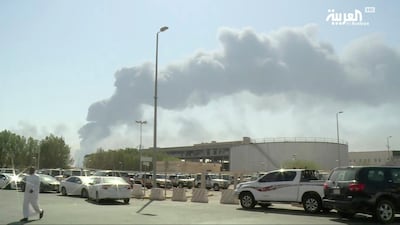The United States blamed Iran for attacks on two Saudi Aramco facilities on Saturday that were claimed by Houthi rebels in Yemen.
Saturday's explosions set off fires that engulfed the Abqaiq plant, the world's largest oil processing facility, and nearby Khurais, which hosts a massive oil field. The full extent of the damage was not clear, nor the type of weapons used. The strikes caused no casualties.
But Secretary of State Mike Pompeo accused Tehran of carrying out the strikes in Saudi Arabia, in the latest escalation between Tehran and Washington after months of tit-for-tat moves.
“Tehran is behind nearly 100 attacks on Saudi Arabia while [Iranian President Hassan] Rouhani and [Foreign Minister Javad] Zarif pretend to engage in diplomacy,” Mr Pompeo said on Twitter.
“Amid all the calls for de-escalation, Iran has now launched an unprecedented attack on the world’s energy supply.”
Mr Pompeo also rejected Houthi claims that they were behind the attack and said there was "no evidence" that Saturday’s attacks had come from Yemen.
"We call on all nations to publicly and unequivocally condemn Iran's attacks. The United States will work with our partners and allies to ensure that energy markets remain well supplied and Iran is held accountable for its aggression," Mr Pompeo said.
Iran's Foreign Ministry dismissed the US accusation that it was behind the attacks, calling it part of Washington's policy of "maximum lies".
Iraq also denied that its country was the site from where the drones were launched to attack the Saudi oil installations.
The statement came from Iraqi Prime Minister Adel Abdul-Mahdi's office on Sunday.
It says Iraq would act "decisively" if anyone tried to use its territory to attack other countries.
US officials previously alleged at least one recent drone attack on Saudi Arabia came from Iraq, where Iran backs Shiite militias, something denied by Baghdad. Those militias in recent weeks have been targeted themselves by mysterious air strikes, with at least one believed to have been carried out by Israel. In recent months, the Houthis have staged repeated cross-border missile and drone attacks targeting Saudi air bases and other facilities.
The White House condemned the attacks following a phone call between US President Donald Trump and Saudi Crown Prince Mohammed bin Salman.
"Violent actions against civilian areas and infrastructure vital to the global economy only deepen conflict and mistrust," the White House said.
Earlier, Saudi state media reported that Prince Mohammed had said the kingdom was "willing and able" to respond to this "terrorist aggression".
The attacks "resulted in a temporary suspension of production at Abqaiq and Khurais plants," Prince Abdulaziz bin Salman, Saudi Arabia's energy minister, said on Saturday night.
Prince Abdulaziz said the production shutdown led to the interruption of about 5.7 million barrels of crude oil, or about 50 per cent of total production, the official Saudi Press Agency reported.
The Saudi energy minister said the attacks were a threat to the world's oil supply and security and, as a result, the global economy.
After visiting the site of the attacks, Saudi Aramco president and chief executive Amin Nasser said work was under way to restore production and an update would be given in 48 hours.
“We are gratified that there were no injuries. I would like to thank all teams that responded timely to the incidents and brought the situation under control," he said.
The UAE earlier led international condemnation of the attacks.
The Ministry of Foreign Affairs and International Co-operation denounced the drone attack as a "terrorist and subversive act," and said it is new evidence of terrorist groups looking to undermine security and stability in the region.
"The security of the UAE and Saudi Arabia is inseparable. Any threat to the Kingdom of Saudi Arabia is seen as a threat to the stability and security of the UAE," the ministry said.
The UN's Yemen envoy Martin Griffiths said he was "extremely concerned" over the latest attacks, which also drew swift condemnation from Riyadh's other Gulf allies, Bahrain and Kuwait.
Turkey, an ally of Iran, condemned the attack but called for avoiding "all sorts of provocative steps" that could damage regional security and stability, the foreign ministry said.
In an apparent new warning to the US, Iran said on Sunday that US bases and aircraft carriers are within range of Iranian missiles.
"Everybody should know that all American bases and their aircraft carriers in a distance of up to 2,000 kilometres around Iran are within the range of our missiles," said Amirali Hajizadeh, head of Iran's Revolutionary Guard s Corps Aerospace Force.
The semi-official Tasnim news agency also quoted Mr Hajizadeh as saying that "Iran has always been ready for a full-fledged war".
White House adviser Kellyanne Conway said on Sunday the US Energy Department is prepared to tap into the Strategic Petroleum Reserve after attacks on Saudi oil facilities if needed to stabilize the global energy supply.
In an interview with "Fox News Sunday," Ms Conway also did not rule out a possible meeting between Mr Trump and Iran's leader Hassan Rouhani on the sidelines of the UN General Assembly in New York, but said the attack "did not help" that prospect.

